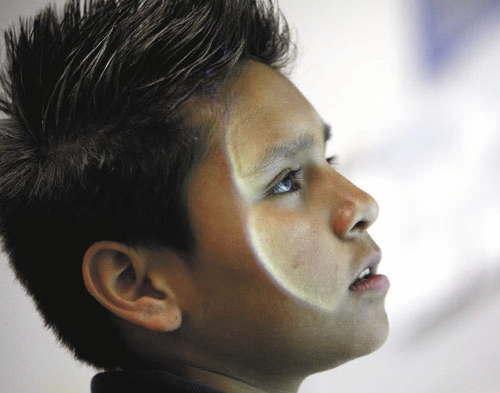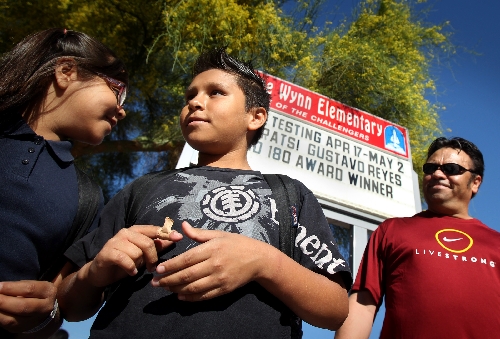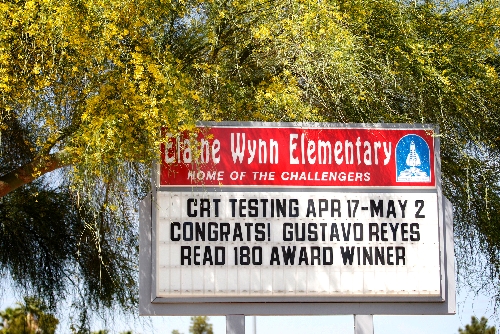Lagging readers turn 180 degrees
Fifth-grader Gustavo Reyes mouths words into a classroom computer as his "papi" does the same thing.
"I'm learning with them," his 53-year-old father says.
The elder Gustavo Reyes, who has been in America for 20 years, is making the effort to learn more than basic English to keep up with his two children.
A year ago, Wynn Elementary School pulled the fifth-grader and his younger sister into Read 180, an intervention program created by children's book publisher Scholastic for students who lag years behind in their reading skills.
Even Gustavo's mother opens her children's Read 180 books after work. But she waits until the rest of the family is at soccer practice.
"My English is not very good. They laugh at me," she says, while sitting on the couch between son Gustavo and 9-year-old daughter, Natalia.
"Say SpongeBob SquarePants," the kids snicker in her ears.
Last year, 11-year-old Gustavo read at a kindergarten level. But he has caught up to his fifth-grade peers. Other students at Wynn were even further behind. The school's enrollment is 80 percent Hispanic, a group that includes students with little or no English, like Juan Valdivia.
Before joining Read 180, he was in special education, not because he had learning disabilities but because he was starting English from scratch.
"The first word I spoke in English was chocolate," says Juan, pronouncing the word with pride.
He's still catching up, but he now reads to his 5-year-old brother at home because his parents only speak Spanish.
"He copies me, and I tell him what it means," Juan says.
He also helps his dad with unfamiliar words.
"Reading is a struggle for our students," says Wynn Principal Ellen Bordinhao, who juggles the school's budget to give the Read 180 teacher all the books she needs for 60 students.
About 40 other Wynn students need more intense instruction than Read 180 and take Scholastic's System 44, which teaches the 44 sounds of the letters of the alphabet. "It works."
That's because Read 180 and System 44 make students want to read, says teacher Yolanda Jaramillo as students walk by her into class on the morning of April 30.
"Can I take the test?" Gustavo begs, holding the 136-page chapter book "Fig Pudding" in his hand. He read it over the weekend. It wasn't assigned.
"The kids want to take the test. How crazy is that?" Jaramillo says.
She knows why it works. Competition.
Her class wall is covered in charts, graphs and lists of standings, which students track as closely as their dads follow sports.
Students want to be "Top Reader." After reading a book, students take a 10-question test and must correctly answer seven questions to add points to their scores. "Fig Pudding" is worth 28,970 points because that's its number of words. Gustavo has 156,524 points for the year, the most of any fifth-grader.
"They're constantly checking their scores. That's what drives them," Jaramillo says.
The school holds a lunch assembly to honor the high scorers.
"They just think they're rocking," says Bordinhao, noting that students aren't ashamed of being put into Read 180 and System 44. They revel in it. The goal is to raise students up so they can return to their normal reading classes.
For Gustavo's 180-degree turnaround, he also received national recognition, becoming one of 12 students in the nation named Read 180 All Stars. It earned him $1,200 from Scholastic and $1,000 for his teacher to buy books.
TRACKING PROGRESS
As a teacher, Jaramillo can track every key stroke that her students make in the computer reading programs, which students interactively use with headsets to sound out words and develop basic reading skills. Anyone who's not progressing receives special attention from Jaramillo.
For that reason, classroom desks aren't arranged in rigid rows with a teacher up front. Students cluster together instead.
On this particular day, a small group of girls read aloud to each other in the middle of the room. Boys sit at perimeter tables working at computers, wearing headsets and microphones. Another boy stands at the front of the class testing on a touch screen.
When faced with the question, "The opposite of takes is (grinbs)," He uses his finger to unscramble the clue and writes, "brings."
"Technology is the special sauce," says Scholastics Education President Margery Mayer in Philadelphia.
Schools pay about $100 per student per year for rights to Read 180. It's used in 91 Clark County public schools, mostly middle schools, says Annie Amoia, the district's executive director of instructional support. The district started the program at 10 schools in 1999.
Read 180 is at its highest demand in urban areas like Las Vegas, Mayer says. That's because reading often isn't a habit or viewed as a form of enjoyment among those living in poverty, she says.
Populations of limited English speakers also concentrate in cities, she says.
Clark County schools use several reading intervention programs, Amoia says.
"Reading. It's the linchpin of everything," she says, noting that the district is starting to give schools freedom in determining the reading intervention programs that best fit their students.
"Schools know what their students need."
GAINING CONFIDENCE
Miguel Soto-Moreno, 11, needed Read 180 so he could read to a computer and not a person. He's shy, or used to be.
"His cheeks get red," jokes his friend Juan Valdivia sitting at the table with him.
At home, Miguel waits until he's alone to read aloud. He will read in front of his 3-year-old brother - Miguel is teaching him English - or in class because he must.
He can be heard whispering to himself the words of "Leader of the Pack," a book about the 1995 reintroduction of wolves in Yellowstone National Park.
He's trying to take the high score away from Gustavo.
But scores aren't the goal, just the trick to get students interested, says Gustavo's father, noting that reading has brought the family closer together.
"Sometimes, when we have nothing to do, we read for two to three hours," says 11-year-old Gustavo, who competes with his sister by reading the same book at the same time. "Dad will look up words when we don't know them."
Gustavo used to "always be quiet, no emotions, unconfident," his dad says. He started the year with a shaggy, non-assuming haircut but now has a shorter 'do gelled up into a subtle Mohawk.
"I'm taking this home," Gustavo tells Jaramillo at the end of class, holding up "Fig Pudding." "My dad wants to read it, too."
Jaramillo tries to hide her giddy smile, but fails.
After Gustavo walks away, she says, "It's a teacher's dream. I can't believe it."
Contact reporter Trevon Milliard at tmilliard@reviewjournal.com or 702-383-0279.

























